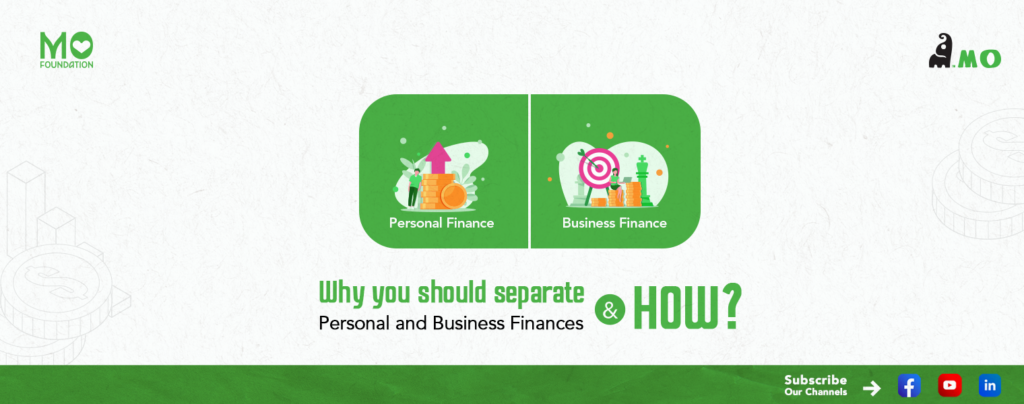
Why do you need to separate personal and business finances and How?
You have plans to become your own boss and set up a small business. Being a sole-proprietor can be a rewarding journey, however it does not come naturally and easy. It can create different kinds of stress and pressures because it now involves your own money invested into this business venture. Your business lives or dies based on the daily revenue.
What’s more stressful for a small business owner is when you do not come from having a financial background. Or even if you are good at numbers, you still scramble not knowing where to begin. Like it or not, as a business leader, there are many angles of the business you have to worry about besides the financials. Being your own boss now you need to know how to manage people, run the operations, sales, marketing, build or leverage from digitalization/technology for scaling up the business.
We understand the frustrations, so we want to tackle the first important angle, the finances, as you plan for your business. You need to know how and where to begin and why it is important to manage it separately from your personal finances.
We have before talked about the 5-steps “Money Wheel” for personal finances (https://mo.com.mm/articles/overall-financial-planning/).
Let us follow the Money Wheel steps and apply them to managing business finances:
Steps | Areas to consider |
INCOME | Now you have to consider the revenues and profits for the business. Should you pay yourself a salary to support your personal income? |
SAVE | Business needs to save for emergency, and enough cash to operate at least 6 months during uncertain times |
SPEND | Business expenditures and inventory procurement. Overhead costs and payrolls. How to be effective in managing the business’ expenses? |
INVEST | Should the business invest to expand? Profits gained from the business to save, pay back investors if any, or how to grow even further for the business? Would you call for more funds for your business? |
PROTECT | Look for ways for the business to be stable and sustainable, setting up reserves or emergency funds for unforeseen economic crises. What kind of risks to the business? Competition that threatens your business? How do you make sure there is no loss (revenue attrition) from the business? |
Although we mentioned the same 5 steps of “Money Wheel” for both personal and business finances, there could be some overlapping or differences because you are the owner of the business. Before your business begins, you can go through each step and ask yourself where the money is coming from, how you will manage it, etc.
Let’s look at the differences between personal and business finances, and what kind of impact it makes if you don’t separate between your own money and the business’ monies.
- Your personal goal in life is retirement and financially secured for you and your family. For your business, you want to have a sustainable model to ensure that the business makes profits in many years to come. Only then, this business can continue to provide financial security for you and your family and now your employees. Business financial planning is more complex, for example, it now involves payroll and inventory which aren’t necessary for personal finances
- If we just talk about the Step 1 – INCOME, the difference between income for yourself and for the business (=revenue). When we start to gain profits for the business, you might have to decide whether you will move all that into our own income, or you pay dividends to all shareholders (if they invest with you), or reinvest back into the business for expansion. Questions like should you get a salary from your business? Most business owners think that this is your own business, therefore you should work for free. How are you going to take care of your personal income and future if you do not draw a salary?
- Financial statements and reports (Individual budgeting versus Business’s Profit & Loss, Cash Flow, Initial Investment Capital). As the financial framework for business is complex, you might have to involve an accountant for this process. We recommend any business owner needs to know at least the foundation of the above three financial statements as you manage the accountant. Know your business by knowing the important financial details.
- Should you have all in your account, or separate accounts? Your business can not enjoy certain financial benefits if you put everything under the personal accounts i.e. getting loans from banks, credit lines, exclusive business tools or account features, access to a more streamlined accounting.
- Misuse of the funds (which is for personal, which is for business?)
- If your business leverages, then it becomes personal liabilities. You might lose your house or other assets if your business can’t serve the loan.
- You are not able to call for investors if you later need cash to expand because the investors might not want any complications between personal and business money.
- Reputation and credibility from business name versus personal name when you need to establish relationships with partners, suppliers and others.
- Taxes (now deal with personal income taxes and business taxes or both now that you have taxes for yourself and employees versus taxes for the business)
Our advice is to keep separate accounts and everything else should follow on from there. Even if you do not register the license for your business, the two accounts, even if under your personal name, should still be serving separate purposes and should not be mixed. The business accounts will be used for client’s payments, payroll and other expenditures, pay yourself a salary to keep the book clean right from the start.